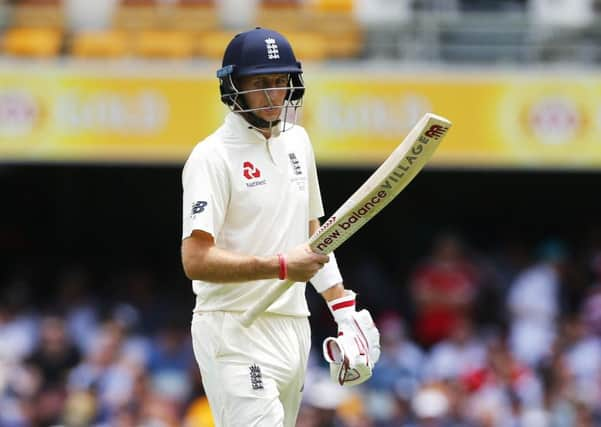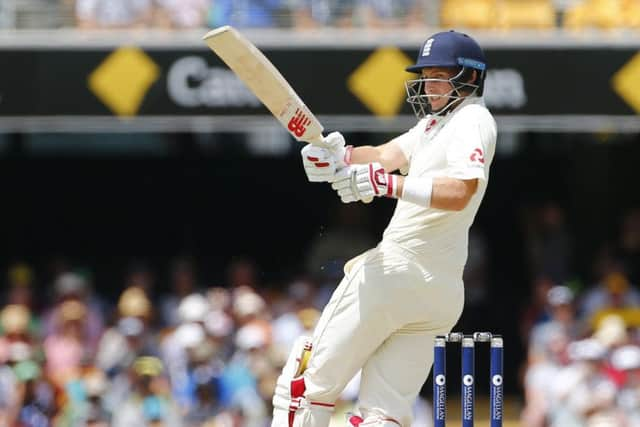Chris Waters: Root has to build on foundations if England are to retain Ashes


On the evidence of the first Test at the Gabba, it is 1-0 to Smith in the clash of the captains.
Smith’s unbeaten 141 in Australia’s first innings remained the biggest difference between the sides going into day five.
Advertisement
Hide AdAdvertisement
Hide AdAustralia needed just 56 more runs with 10 wickets remaining to reach a victory target of 170 after they took control of a hitherto nip-and-tuck contest.


Root, in contrast, contributed scores of 15 in the first innings and 51 in the second as he failed to match his rival’s impact.
The Yorkshireman fell lbw both times in almost identical manner, falling over to the off-side as he tried to hit through mid-wicket.
It is a chink in Root’s armour that Australia will look to exploit further and not, it would seem, the only one.
Advertisement
Hide AdAdvertisement
Hide AdFor whereas Smith struck his 21st Test century to go with 21 fifties, Root now has 33 fifties to go with 13 hundreds, a conversion rate that palpably pales by comparison.


Root, in fact, has the worst conversion rate of any of the “Big Five” of Test cricket’s modern batting masters.
Virat Kohli converts 57 per cent of his half-centuries into three-figure scores, Smith 50 per cent, David Warner 45 per cent and Kane Williamson 40 per cent.
Root is down at 28 per cent – also the lowest of the top-10 batsmen in the world rankings.
Advertisement
Hide AdAdvertisement
Hide AdOn the flip-side, Root reaches fifty more often than any of his main rivals – once every 2.4 innings, with Smith next-best at once every 2.5 innings.
In Test cricket, Root has fallen 29 times between 51 and 90 and, this year, he has been out four times between 50 and 59.
Clearly there is no one better at putting the building blocks in place, but constructing the house on top of the foundations has been more problematic.
Is it harsh to judge Root in this way? After all, he is a magnificent batsman and an equally magnificent ambassador for the sport and his country.
Advertisement
Hide AdAdvertisement
Hide AdRoot leads England with authority and conducts himself impressively on and off the field.
But it is precisely because he is one of the best that he must be judged against the best, for Root is well capable of playing the sort of match-defining innings that Smith delivered for his side at the Gabba.
Of course, this is nothing that Root will not be aware of himself.
England are also aware of a collective conversion rate problem; if not, coach Trevor Bayliss would not have stressed before the start of the series how important it was for batsmen to score centuries as opposed to half-centuries.
Advertisement
Hide AdAdvertisement
Hide Ad“Batsmen scoring 60s is not enough, we need 160s,” asserted Bayliss after the warm-up games.
It has taken only one Test to emphasise the truth of those words.
The battle between Root and Smith – more than just a media concoction for the purposes of hype – is even more important in a series short of genuine world-class talent.
England have two recognised world-class batsmen in Root and Alastair Cook (although I would add Jonny Bairstow to that list), and Australia two in Smith and David Warner, making it imperative that those respective parties perform.
Advertisement
Hide AdAdvertisement
Hide AdCook failed twice in Brisbane, where Bairstow seemed wasted at No 7 as England promoted Moeen Ali to No 6 in the absence of Ben Stokes.
And Root’s wider task has hardly been assisted, it must be said in his defence, by the absence of a vice-captain in Stokes, that could yet define this series from 10,000 miles’ distance.
While the spectre of Stokes still shadows the tour, amid rumours that he may appear at some stage, like a poltergeist at a seance, it is essential that Root focuses on his biggest battle with Smith – that of scoring runs.
Forget funky fields and tactical manoeuvrings, with Root having drawn praise and also criticism during this game for his captaincy, his most important task is to score hundreds – preferably of the daddy, or even the grandaddy variety. Root’s determination to do just that – even if his execution fell short – was evident in the way that he courageously stood up to Australia’s pace bowlers.
Advertisement
Hide AdAdvertisement
Hide AdAny batsman in the game’s history would have been discombobulated by the savage blow that Root took from Mitchell Starc on the third evening, the former Yorkshire pace bowler arrowing a bouncer into his helmet.
But Root dusted himself down and battled tenaciously for his latest half-century.
Yet whereas Smith kicked on and made his innings count, Root fell one ball after reaching his own milestone, his courageous innings curtailed in its prime.
As such, it is first blood not so much to Starc’s bouncer as to Smith’s bat, which stood tall when his country most needed it to, when they were struggling at 209-7 in reply to England’s first innings 302.
Smith has thrown down the gauntlet to Root in no uncertain terms.
It is now up to the England captain to respond.